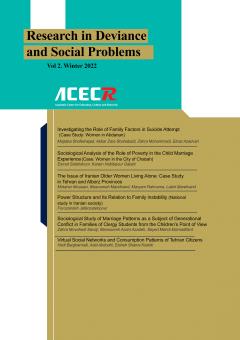Sociological Study of Marriage Patterns as a Subject of Generational Conflict in Families of Clergy Students from the Children’s Point of View
Subject Areas : Research on Iranian social issueszahra movahedi saveji 1 , mansoure azam azade 2 , mahdi etemadi fard 3
1 - M.A in sociology, Al-Zahra University, Iran.
2 - Associate Professor, Department of Social Sciences, Al-Zahra University, Iran.
3 - Associate Professor, Department of Sociology, University of Tehran, Iran.
Keywords: Generational conflicts, Marriage patterns, Clergy student families,
Abstract :
Transitional position of Iran from tradition to modernity, set new conditions in terms of challenges between two generations. One of these challenges is in relation to marriage. Family plays an important role in marriage culture, and actively participate in it. Basically, marriage is interpreted as a family bond. In some eras, initially choosing a spouse did by family; and love marriage was limited. Such pattern has been modified over time. In this study, we seek a descriptive-analytical study of conflicts arising from marriage patterns between clergy parents and their children. Another objective of this study is to examine strategies and approaches employed in conflict resolution. This research utilized a qualitative and grounded theory approach to provide an accurate and detailed explanation of the generational problems within the clergy family. The data from this study suggest that confrontation between clergy parents and their children has three patterns: 1. Endogamy versus Exogamy 2. Haste in marriage versus delay in marriage 3. Marriage based on gerontocracy versus Marriage based on freedom. The following three strategies were identified in their children 's exposure to conflicts in marriage patterns: 1. confrontation strategy 2. Surrender strategy 3. secrecy strategy. According to this study, there is a multiplicity of educational resources as well as a difference between the discourse and epistemological system governing the thought of parents and children. Also based on the research data, children's experience of divorce and their family emotional relationships are highly influential in how they approach conflicts. Furthermore, we have found that parents' attitudes toward girls and boys differ dramatically, which could explain the exacerbation of conflict due to "gender" contexts. Results also note the role of “educational status” as a facilitator of communication, referred to as "facilitating communication".
استراوس، انسلم و جولیت کوربین (1395) مبانی پژوهش کیفی، فنون و مراحل تولید نظریه زمینهای، ترجمه ابراهیم افشار، تهران، نی.
بالس، کریستوفر (1380) ذهنیت نسلی [دیدگاهی روانکاوانه درباره اختلاف نسلها]، ترجمه حسین پاینده، ارغنون، شماره.
پورقنبر، محمدحسن (1398) نوسازی و دگرگونی، بررسی تأثیر تغییرات اجتماعی بر نهاد خانواده در ایران (57-1335)، تهران، شیرازه کتاب ما.
حبیبی، غلامحسین (1393) بینش روش شناختی، تحقیق در علوم اجتماعی، پارادایمها، روشها و تکنیکها، تهران، کتاب همه.
حسینی، سید محمدرضا (5/مرداد/1395) آمار حوزههاي علميه و روحانيون به روايت مشاور وزير فرهنگ، خبرگزاری جمهوری اسلامی.
Available at، https، //www.
irna.
ir (17/دی/1400).
حیدرپور، حانیه (1396) مطالعه جامعهشناختی مواجهه زنان طلبه با مناقشات زناشویی، پایاننامه کارشناسی ارشد، دانشگاه تهران.
خلیلی، رضا (1391) تحول تاریخی-گفتمانی مفهوم استراتژی، فصلنامه مطالعات راهبردی، دوره 15، شماره 58.
ساروخانی، باقر و مجتبی صداقتی فرد (1388) شکاف نسلی در خانواده ایرانی؛ دیدگاهها و بینشها، نامه علوم اجتماعی، دوره 3، شماره 4.
سلیمانیه، مهدی (1397) طلبه زیستن، پژوهشی مقدماتی در سنخ شناسی جامعه شناسی زیست طلبگی، تهران، نگاه معاصر.
شهیدثانی، زینالدینبنعلی (1385) منیه المرید فی ادب المفید و المستفید، ترجمه رضا مختاری، قم، بوستان کتاب.
عبداللهی، علیاصغر (9/دی/1394) ۷ آمار از حوزههای علمیه در ایران، همشهری آنلاین.
Available at https,، //www.
hamshahrionline.
ir (17/دی/1400).
علیخانی، علی اکبر (1383) نگاهی به پدیده گسست نسل ها، رویکرد فلسفه، جامعه شناسی، روانشناسی، سیاسی، تاریخی و ادبی به پدیده شکاف نسلی، تهران، جهاد دانشگاهی، پژوهشگاه علوم انساني و مطالعات اجتماعي.
فیلیک، اووه (1392) درآمدی بر تحقیق کیفی، ترجمه هادی جلیلی، تهران، نی.
قاضینژاد، مریم (1383) نسلها و ارزشها، بررسي و تحليل جامعه شناختی تفاوت گرايشات ارزشي نسل جوان و بزرگسال، پایاننامه دکتری، دانشگاه تهران.
کاظمیپور، عبدالمحمد (1388) نسل ایکس، بررسی جامعهشناختی نسل جوان ایرانی، تهران، نی.
گیدنز، آنتونی (1382) چشمانداز خانواده، بازتاب اندیشه، شماره 44.
---------- (1393) تجدد و تشخص، جامعه و هویت شخصی در عصر جدید، ترجمه ناصر موفقیان، تهران، نی.
معیدفر، سعید (1383) شکاف نسلی یا گسست فرهنگی (بررسی شکاف نسلی در ایران)، نامه علوم اجتماعی، دوره 24، شماره 24.
وافی، احمدیاسر (21/06/1396) چه سنی برای ازدواج طلبهها مناسب است؟، پایگاه اطلاعرسانی نشستهای دورهای اساتید سطوح عالی و خارج حوزه علمیه قم.
Available at، https //neshasteasatid.
com,(17/دی/1400).
وبر، ماکس (1382) دﻳﻦ، ﻗﺪرت، ﺟﺎﻣﻌﻪ، ﺗﺮﺟﻤﺔ اﺣﻤﺪ ﺗﺪﻳﻦ، ﺗﻬﺮان، هرمس.
-------- (1395) روششناسی علوم اجتماعی، ﺗﺮﺟﻤﺔ حسن چاوشیان، ﺗﻬﺮان، مرکز.
هیوز، هنری استوارت (1369) آگاهی و جامعه، ترجمه عزتالله فولادوند، تهران، انتشارات و آموزش انقلاب اسلامی.
یوسفی، نریمان (1383) شکاف بین نسلها، بررسی تجربی و نظری، تهران، جهاد دانشگاهی، پژوهشگاه علوم انساني و مطالعات اجتماعي.
Good, W (1964) World Revolution and Family Patterns, London، Oxford University Press.
Even-Zohar, Ahuva (2015) Grandparent-Grandchild Relationships in Israel: A Comparison between Different Jewish Religious Groups, Journal of Intergenerational relationships, Vol. 13.
Lorenzini, J; Monsch, G. A.; Rosset, J (2021) Challenging Climate Strikers' Youthfulness: The Evolution of the Generational Gap in Environmental Attitudes Since 1999, Frontiers in Political Science, May.


